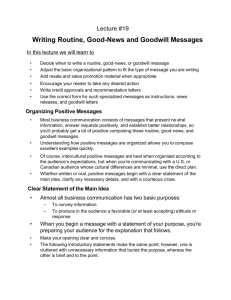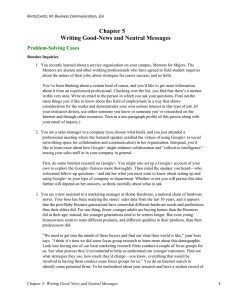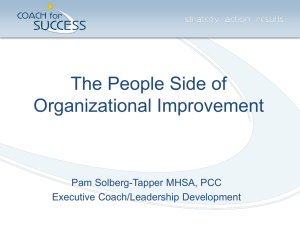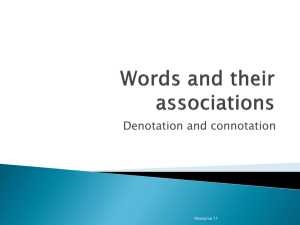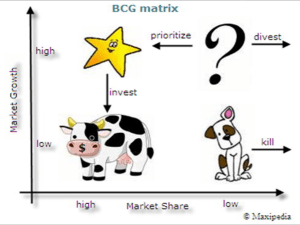good-news-and-neutral
advertisement
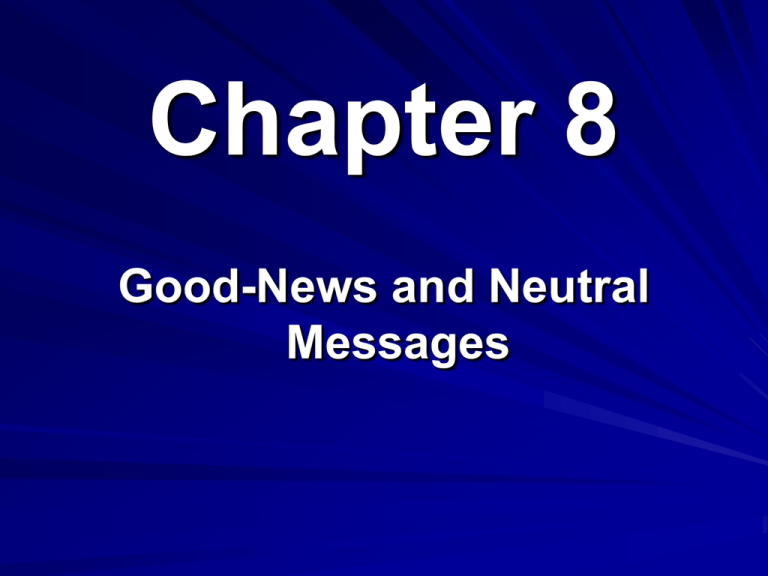
Chapter 8 Good-News and Neutral Messages Good-News and Neutral Messages What is Good-News and Neutral Message A message that will receive favorable response or neutral reaction from your reader is usually easy to write because such messages tells your reader something pleasant or offer usual information. These messages are generally organized by the direct approachalso known as good-news plan “ Good-News and Neutral Messages” What are the types of organizational plans? What points will you consider for a business messages acknowledging first order? List the organizational plans for direct and good news messages? Types of organizational plans There are two types of organizational plans Direct Plan. Indirect Plan. Direct plan You need to emphasis on three things. First:best news or main idea. Middle:explanation should be complete. Third:positive ending. Direct plan Provide all necessary details,facts and specific detail on the five Ws. What. Why. When. Who. Where. Indirect plan In this you do not say best news first. You beat about the bush. Your audience may become tired. Good-News and Neutral Messages Favorable Replies: To help build goodwill, a progressive organization replies to all reasonable requests courteously, hopefully, and promptly. The different type of favorable replies are as follows: I 1. Answering inquiries: Among most frequent non-sales-related inquiries are requests for information about personal and credit applicants. 1. Granting Requests for Adjustment: An adjustment letter is the reply to a complaint (called a claim letter) 1. Approving Credit: The message telling the customer that you are granting often includes all parts of the basic news plan-best news first and then terms, resale, sales promotion and appreciation. Good-News and Neutral Messages 4. Acknowledging Orders: An acknowledgement performs several important function. It let buyers know that the order has been received, is appreciated, and is given attention. 5. Granting Favors and Other Requests: A letter showing your granting favor by serving a committee, speaking at a convention, donating money, or lending your firm’s equipment without charge, good news plan is best to use. 6. Job Acceptance Letters: A job acceptance letter is generally a short and expresses your enthusiasm for the position offered. Good-News and Neutral Messages Goodwill Messages: Goodwill messages are different from the usual business documents in that they express feelings rather than information or persuasion, and therefore are little bit different in writing. 7. ( Although it may be tempting to send printed cards, it is always more personal and meaningful to recipients to send a written note of appreciation, congratulations, or sympathy) Types of Goodwill Messages Letter of Appreciation Letter of Congratulation Letter of Condolence Answering inquiries: While giving recommendations,remember the things. Be honest towards the applicant. Mention his best qualities. Do not lie. Put yourself in the place of inquirers. What are the recomm-endations for outstanding candidates. For shortcomings candidates. Acknowledging orders: Acknowledgment of first order. Sending the ordered items. Specific resale material. Looking for future orders. Good-News and Neutral Messages Letter of Appreciation: Thank you notes should be written whenever someone does a favor or when an action deserves praise. These notes may be written to customers for their orders, to colleagues for their support, and to individuals for any special favor they have done for you or for your company. Letter of Congratulation: Congratulatory notes should be sent for business and personal achievements and milestones. As in letters of appreciation, they should use the good-news organizational plan and focus on reader. Letter of Condolence: Expression of sympathy to someone who has experienced grief or misfortune are difficult to write and demand special sensitivity on the part of writer. Good-News and Neutral Messages Neutral Messages: The neutral messages are unsolicited messages. The are either announcements or transmittals. 1. Announcing Sales and Events: Luncheon, conference, celebration, meeting, or other function about which you need merely to inform you reader. 2. Announcing Procedure, Policies, and Responsibilities: Some businesses use “directives” to announce to employees official statements of company policies, procedures and employees responsibilities. • They may cover a wide variety of topics, ranging from assigned parking spaces and office hours to policies about salary increases, retirement benefits, overtime and treatment of customers. Good-News and Neutral Messages 3. Announcing Honors and Activities of People: To inform employees and customers about promotions, awards, honors, new appointments, retirements, and other recognition-deserving activities of various persons, it is recommended to send announcements Good-News and Neutral Messages Transmittal: A transmittal is a letter or a memo that simply sends a document to the reader. Transmittals are also called “covering letters” have many uses. They range from 5- to 10-line notes to lengthy official letters that accompany, explain, or justify documents For routine business to consumers, employees, or other persons, a cordial short note is sufficient to transmit one or more items such as check, policy, passbook, warranty deed, or map. Transmittal that accompany official documents, bid, applications, proposals, or formal reports should be carefully worded letters. Neutral Messages: These are the messa-ges neither good nor bad. It has two sections. Announcements. Transmittals. Announcement: Announcement of neutral information should follow the good news. Transmittals: It is simply a memo or letter that sends a document to a reader. Good-News and Neutral Messages Organizational Plan for Good-News and Neutral Message 1. First: Best news or main idea 2. Middle: Explanation, with one or more following, when appropriate: all necessary details, educational informattion, resale, sales promotion. 3. Last: Positive, friendly ending, with a clear statement of action desired, motivation to action, willingness to help further, appreciation End of Chapter 8
